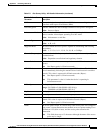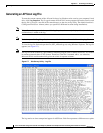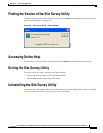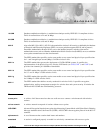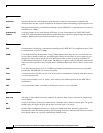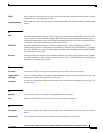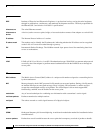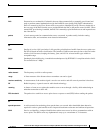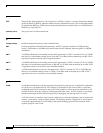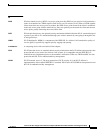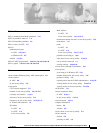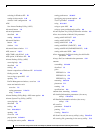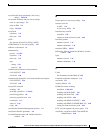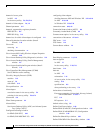
Glossary
GL-5
Cisco Aironet 802.11a/b/g Wireless LAN Client Adapters (CB21AG and PI21AG) Installation and Configuration Guide
OL-4211-03
P
PAC
Protected access credentials. Credentials that are either automatically or manually provisioned and
used to perform mutual authentication with the RADIUS server during EAP-FAST authentication.
PACs are created by the Cisco Secure ACS server and are identified by an ID. The user obtains his or
her own copy of the PAC from the server, and the ID links the PAC to the profile created in ADU. When
manual PAC provisioning is enabled, the PAC file is manually copied from the server and imported onto
the client device.
packet
A basic message unit for communication across a network. A packet usually includes routing
information, data, and sometimes error detection information.
Q
QoS
Quality of service. QoS on wireless LANs provides prioritization of traffic from the access point over
the WLAN based on traffic classification. The benefits of QoS become more obvious as the load on the
wireless LAN increases, keeping the latency, jitter, and loss for selected traffic types within an
acceptable range.
QPSK
Quadruple phase shift keying. A modulation technique used by IEEE 802.11-compliant wireless LANs
for transmission at 2 Mbps.
R
radio channel
The frequency at which a radio operates.
range
A linear measure of the distance that a transmitter can send a signal.
receiver sensitivity
A measurement of the weakest signal a receiver can receive and still correctly translate it into data.
RF
Radio frequency. A generic term for radio-based technology.
roaming
A feature of some access points that enables users to move through a facility while maintaining an
unbroken connection to the LAN.
RTS threshold
The packet size at which an access point issues a request to send (RTS) before sending the packet.
S
spread spectrum
A radio transmission technology that spreads data over a much wider bandwidth than otherwise
required in order to gain benefits such as improved interference tolerance and unlicensed operation.
SSID
Service set identifier. A unique identifier that stations must use to be able to communicate with an
access point. The SSID can be any alphanumeric entry up to a maximum of 32 characters.



